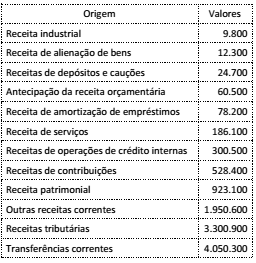Questões de Concurso
Comentadas para oficial de chancelaria
Foram encontradas 165 questões
Resolva questões gratuitamente!
Junte-se a mais de 4 milhões de concurseiros!
A probabilidade de que o número da segunda bola retirada da urna seja par é:
“Como as segundas-feiras são dias horríveis, elas estão abolidas a partir de hoje. Assim, em nosso reino, cada semana terá apenas 6 dias, de terça-feira a domingo. Portanto, como hoje é domingo, amanhã, o primeiro dia do ano novo, será terça-feira."
O ano novo não foi bissexto. Então, nesse reino distante, o dia de Natal (25 de dezembro) desse ano caiu em:
“Corro e não fico cansado".
Uma sentença logicamente equivalente à negação da sentença dada é:

O preço aproximado de 1,0kg desse produto é:
A despesa pública compreende o conjunto de dispêndios do Estado para assegurar o funcionamento dos serviços públicos e apresenta classificações legalmente requeridas para permitir um adequado controle ao longo da execução orçamentária.
A classificação da despesa que possibilita indicar se os recursos são aplicados diretamente no âmbito da mesma esfera de Governo ou por outro ente da Federação e permite a eliminação da dupla contagem dos recursos transferidos ou descentralizados é:

A partir das receitas apresentadas na tabela, o total das receitas que devem ser consideradas no cálculo da RCL é:
Os créditos adicionais especiais são abertos para despesas:
De acordo com esse modelo:
À luz da sistemática constitucional, é correto afirmar que:
À luz da sistemática constitucional e da análise das informações fornecidas na narrativa acima, é correto afirmar, a respeito dos dois amigos, que:
TEXT III
Use of language in diplomacy
What language should one use when speaking to diplomats, or what language should diplomats use? Or, to be more precise, what language/languages should a (young) diplomat try to learn to be more successful in his profession?
The term "language in diplomacy" obviously can be interpreted in several ways. First, as tongue ("mother" tongue or an acquired one), the speech "used by one nation, tribe, or other similar large group of people"; in this sense we can say, for example, that French used to be the predominant diplomatic language in the first half of the 20th century. Second, as a special way of expressing the subtle needs of the diplomatic profession; in this way it can be said, for example, that the delegate of such-andsuch a country spoke of the given subject in totally nondiplomatic language. Also, the term can refer to the particular form, style, manner or tone of expression; such as the minister formulated his conditions in unusually strong language. It may mean as well the verbal or non-verbal expression of thoughts or feelings: sending the gunships is a language that everybody understands.
All of these meanings - and probably several others - can be utilised in both oral and written practice. In any of these senses, the use of language in diplomacy is of major importance, since language is not a simple tool, vehicle for transmission of thoughts, or instrument of communication, but very often the very essence of the diplomatic vocation, and that has been so from the early beginnings of our profession. That is why from early times the first envoys of the Egyptian pharaohs, Roman legates, mediaeval Dubrovnik consuls, etc., had to be educated and trained people, well-spoken and polyglots.
Let us first look into different aspects of diplomatic language in its basic meaning - that of a tongue. Obviously, the first problem to solve is finding a common tongue. Diplomats only exceptionally find themselves in the situation to be able to communicate in one language, common to all participants. This may be done between, for example, Germans and Austrians, or Portuguese and Brazilians, or representatives of different Arab countries, or British and Americans, etc. Not only are such occasions rare, but very often there is a serious difference between the same language used in one country and another.
There are several ways to overcome the problem of communication between people who speak different mother tongues. None of these ways is ideal. One solution, obviously, is that one of the interlocutors speaks the language of the other. Problems may arise: the knowledge of the language may not be adequate, one side is making a concession and the other has an immediate and significant advantage, there are possible political implications, it may be difficult to apply in multilateral diplomacy, etc. A second possibility is that both sides use a third, neutral, language. A potential problem may be that neither side possesses full linguistic knowledge and control, leading to possible bad misunderstandings. Nevertheless, this method is frequently applied in international practice because of its political advantages. A third formula, using interpreters, is also very widely used, particularly in multilateral diplomacy or for negotiations at a very high political level - not only for reasons of equity, but because politicians and statesmen often do not speak foreign languages. This method also has disadvantages: it is time consuming, costly, and sometimes inadequate or straightforwardly incorrect. […] Finally, there is the possibility of using one international synthetic, artificial language, such as Esperanto; this solution would have many advantages, but unfortunately is not likely to be implemented soon, mostly because of the opposition of factors that dominate in the international political - and therefore also cultural and linguistic - scene.
So, which language is the diplomatic one? The answer is not simple at all […].
Words are bricks from which sentences are made. Each sentence should be a wound-up thought. If one wants to be clear, and particularly when using a language which he does not master perfectly, it is better to use short, simple sentences. On the contrary, if one wishes to camouflage his thoughts or even not say anything specific, it can be well achieved by using a more complicated style, complex sentences, digressions, interrupting one's own flow of thought and introducing new topics. One may leave the impression of being a little confused, but the basic purpose of withholding the real answer can be accomplished.
(adapted from http://www.diplomacy.edu/books/language_and_
diplomacy/texts/pdf/nick.PDF)
TEXT III
Use of language in diplomacy
What language should one use when speaking to diplomats, or what language should diplomats use? Or, to be more precise, what language/languages should a (young) diplomat try to learn to be more successful in his profession?
The term "language in diplomacy" obviously can be interpreted in several ways. First, as tongue ("mother" tongue or an acquired one), the speech "used by one nation, tribe, or other similar large group of people"; in this sense we can say, for example, that French used to be the predominant diplomatic language in the first half of the 20th century. Second, as a special way of expressing the subtle needs of the diplomatic profession; in this way it can be said, for example, that the delegate of such-andsuch a country spoke of the given subject in totally nondiplomatic language. Also, the term can refer to the particular form, style, manner or tone of expression; such as the minister formulated his conditions in unusually strong language. It may mean as well the verbal or non-verbal expression of thoughts or feelings: sending the gunships is a language that everybody understands.
All of these meanings - and probably several others - can be utilised in both oral and written practice. In any of these senses, the use of language in diplomacy is of major importance, since language is not a simple tool, vehicle for transmission of thoughts, or instrument of communication, but very often the very essence of the diplomatic vocation, and that has been so from the early beginnings of our profession. That is why from early times the first envoys of the Egyptian pharaohs, Roman legates, mediaeval Dubrovnik consuls, etc., had to be educated and trained people, well-spoken and polyglots.
Let us first look into different aspects of diplomatic language in its basic meaning - that of a tongue. Obviously, the first problem to solve is finding a common tongue. Diplomats only exceptionally find themselves in the situation to be able to communicate in one language, common to all participants. This may be done between, for example, Germans and Austrians, or Portuguese and Brazilians, or representatives of different Arab countries, or British and Americans, etc. Not only are such occasions rare, but very often there is a serious difference between the same language used in one country and another.
There are several ways to overcome the problem of communication between people who speak different mother tongues. None of these ways is ideal. One solution, obviously, is that one of the interlocutors speaks the language of the other. Problems may arise: the knowledge of the language may not be adequate, one side is making a concession and the other has an immediate and significant advantage, there are possible political implications, it may be difficult to apply in multilateral diplomacy, etc. A second possibility is that both sides use a third, neutral, language. A potential problem may be that neither side possesses full linguistic knowledge and control, leading to possible bad misunderstandings. Nevertheless, this method is frequently applied in international practice because of its political advantages. A third formula, using interpreters, is also very widely used, particularly in multilateral diplomacy or for negotiations at a very high political level - not only for reasons of equity, but because politicians and statesmen often do not speak foreign languages. This method also has disadvantages: it is time consuming, costly, and sometimes inadequate or straightforwardly incorrect. […] Finally, there is the possibility of using one international synthetic, artificial language, such as Esperanto; this solution would have many advantages, but unfortunately is not likely to be implemented soon, mostly because of the opposition of factors that dominate in the international political - and therefore also cultural and linguistic - scene.
So, which language is the diplomatic one? The answer is not simple at all […].
Words are bricks from which sentences are made. Each sentence should be a wound-up thought. If one wants to be clear, and particularly when using a language which he does not master perfectly, it is better to use short, simple sentences. On the contrary, if one wishes to camouflage his thoughts or even not say anything specific, it can be well achieved by using a more complicated style, complex sentences, digressions, interrupting one's own flow of thought and introducing new topics. One may leave the impression of being a little confused, but the basic purpose of withholding the real answer can be accomplished.
(adapted from http://www.diplomacy.edu/books/language_and_
diplomacy/texts/pdf/nick.PDF)